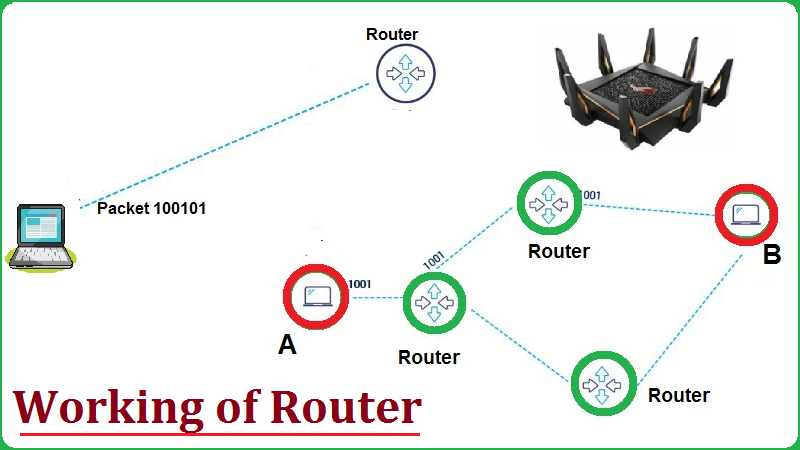Router is a network hardware device that allows to make communication in between the internet and all devices which linked to the internet in your house and office.
In this section, we will spread the light about how to work router in the computer networking, and you must be knowing overview the working of router.

Router has responsible to receives, analyze, and forward the all data packets from the modem. Once done, transfer it to the destination point. After reaching the data packets, the router monitors the destination address. Get to make consultation its routing table that take the decision which is the best route for transferring the data packets.
Working of Router
Binary format like as (0s and 1s) bits form that is easily understandable by machines. And packets which are group of these bits, they traverse over the network. Entire mechanism through those series of packets transmits over the network that managed by the IP (Internet Protocol).
Explanation Example with Diagram
End devices such as (PC, laptop or phone) which generate the few sequences of data into Bit form. And then IP always ready to send these packets to further processing. If, massive amount of information to be broadcasted then huge amount of bit are required for sending along with packets format.

All IP (Internet Protocol) packets let transmit along with their paths across the network. Then router has responsible for getting to packet routing to destination point.

While sending and receiving all data packets, each device appends the IP address with these packets; IP address means unique address like as your postal house address. The main goal of IP address like as postal address, it means it identifies the sender and receiver over the network.
So, router has the all information that which path is better to send packets across network. This information stores into routing table, but before sending any packet, it takes the decision that route is OK for forwarding them. So, this processing is known as the “Routing Process“.
How Does Router Identify That What is Better Route?
Router has own ports or other interfaces which are getting to make interface along with other connected network devices. Interfaces help to make communication with links that use for packet forwarding. Links means that cable, fiber or even wireless.
Routing Process Mechanism
- When packet reaches on the interface, then router must be knowing that which interface get need to use for sending out the packet.
- Router monitors the Routing Table which has entries related to every aware to Destination point.
- Every Routing Entry holds the destination address and address of further device on path known Next HOP device.
- Then, existing NEXT HOP address, router has capable to check the outgoing interface and ready to sends the packets.
Routing Protocols
This protocol helps to specify a best path for router to identify other router over the network. There are various protocols; below explain each one-
Also Read: Router Advantages, Disadvantages, and Applications
Open Shortest Path First (OSPF): Use to manipulate the better path for given packets to arrive the destination point.
Border Gateway Protocol (BGP): This protocol helps to manage that how packets do flowed over the internet through exchange of information in between the edge routers.
Interior Gateway Routing Protocol (IGRP): It helps to identify how routing information will be exchanged in between the gateways along with an independent network.
Enhanced Interior Gateway Routing Protocol (EIGRP): In this protocol, router is unable to search a best route to a destination from the routing table. So, it asks route to its neighbors, and they pass query to their neighbors while finding the path.
Exterior Gateway Protocol (EGP): It helps to take decision that how to exchange the information in between two neighbors gateway hosts.
Routing Information Protocol (RIP): This protocol helps to determine that how router can share information while transmitting traffic with connected group of LAN networks.



